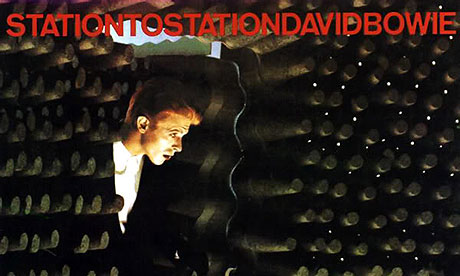
In just six (long) tracks, Station to Station manages to incorporate almost everything fantastic about pop music: it's dramatic, stylish, emotional and danceable. It's not the most celebrated Bowie album – that would be The Rise and Fall of Ziggy Stardust and the Spiders from Mars or Low – but it's been my favourite right from the moment I heard it, aged 16. The sleeve alone has a huge sense of occasion, with bold red typography that omits the spaces between the words, and a glorious picture of a drip-thin Bowie emerging from a spacecraft, a still from his film The Man Who Fell to Earth.
Then there's the mythology. Being a teenager, I was particularly susceptible to the stories about this record – that it was made in a cocaine blizzard in LA that involved witchcraft, the collecting of Nazi memorabilia and an exorcism that left a silhouette of Satan stained on the bottom of a swimming pool. Yet despite the fact that Bowie was at his maddest (he told NME that Britain needed a fascist leader a few weeks after the album's release in 1976), and so out of it that he can't even remember recording the thing, Station to Station is almost frighteningly accomplished, with a glittering, malevolent glamour I've heard on no other record.
Has there ever been a more epic album opener than the title track? The first minute is just a sound effect – a train travelling counter-intuitively from the right speaker to the left. There are screams of feedback, and then the band kick in with a kind of art-rock death march before Bowie finally announces his presence, operatically declaiming one of the great first lines: "The return of the thin white duke, throwing darts in lovers' eyes."
The Thin White Duke was Bowie's final persona, a character who embodied the allure of evil, immaculately dressed in waistcoat and Oxford bags, crooning rather than rocking out, determinedly European. He's never looked or sounded better.
As the song reaches the five-minute mark, speeds up and suddenly turns into a full-on disco number, the Duke shows his decadence in another line that impressed the 16-year-old me no end: "It's not the side-effects of the cocaine – I'm thinking that it must be love". Narcotically fuelled, dropping oblique references to Crowley and strange religions, Bowie blasts away his immediate Philly soul past and speeds into a more experimental future over 10 totally exhilarating minutes. The Berlin trilogy of albums would come next: as Bowie announces, "the European cannon is here".
That such a monumental opener doesn't overshadow the rest of the album shows how much Bowie was on fire. Golden Years – a big hit in both the UK and US – refines the "plastic soul" of previous album Young Americans into something suave and addictive. Stay is savage funk deconstructed by brilliant, if audibly wired, musicians. I used to feel that TVC15 was rather pedestrian compared to the rest of the album, but its second half is just inspired, jet-propelled by hysterical backing vocals, what sounds like a crazed concert pianist, and feedback that's almost musique concrete. It becomes apparent over the course of Station to Station that Bowie had found a band that could do almost anything, from Broadway-style showstoppers to krautrock – which is no doubt why he stuck with them (and vice versa) through the rest of the decade, Low, Heroes and all.
The two other tracks are ballads that get to the heart of Station to Station's – and Bowie's – ultimate appeal. Word on a Wing has a lyric whose meaning still remains tantalisingly out of reach: is it about a quest for meaning in life? For God? Is it sincere, or some kind of demonic piss-take? Then there's Wild Is the Wind, a cover of a song made famous by Nina Simone, on which Bowie gives a Sinatra-esque vocal performance so earth-shaking that it would have most other singers waving the white flag.
It's the tension between the artifice and the emotion, the sheer enigmatic complexity of what's being expressed, and the uncanny feeling that the band are creating something that's not entirely down to their own consciousness that has kept me listening to Station to Station for more than 20 years. The cocaine had one welcome side-effect: the fact that Bowie doesn't remember making it means it will never be demystified, and the Duke's corrupt glamour will therefore never fade.
• You can write your own review of this record on our brand new album pages: once you're signed into the Guardian website, visit the album's dedicated page.
Or you could simply star rate it, or add it to one of your album lists. There are more than 3m new pages for you to explore as well as 600,000-plus artists' pages – so simply find their albums and get to work …

